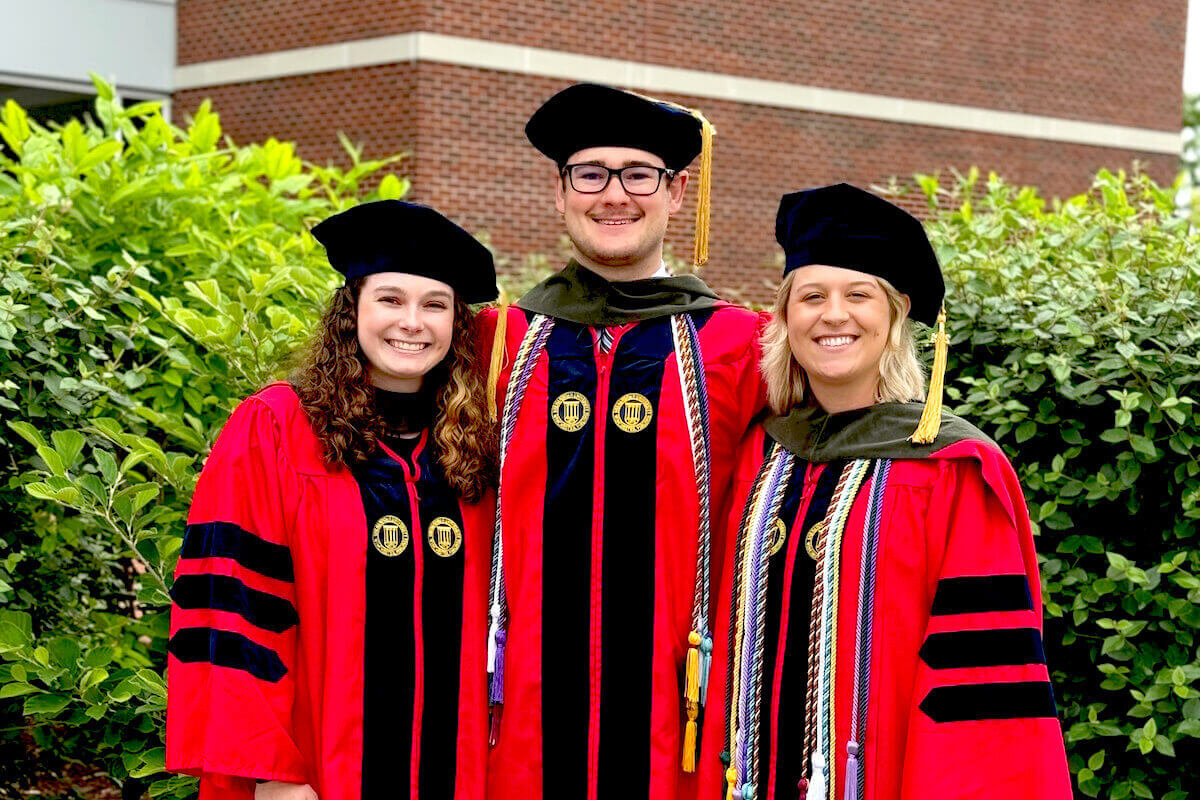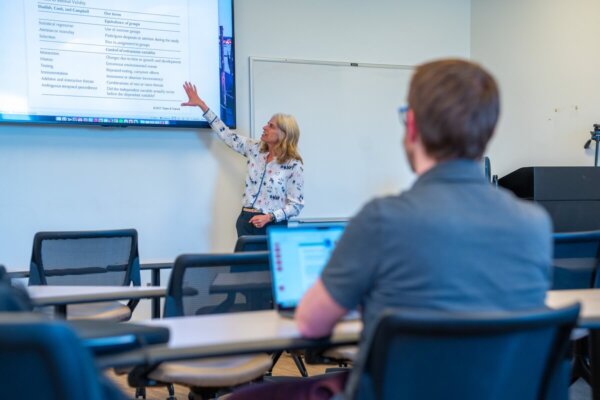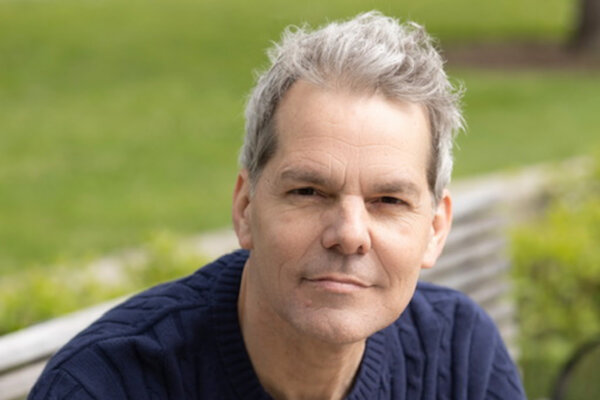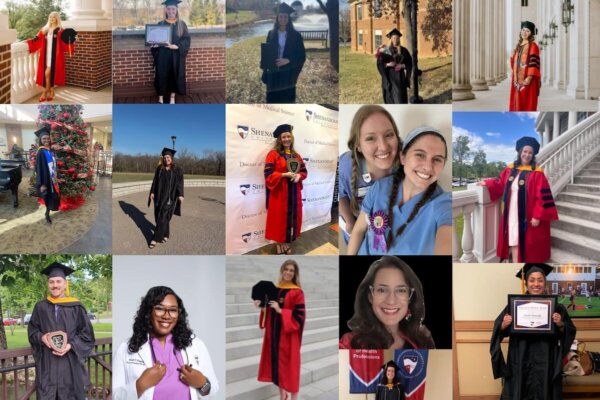Famed Character Actor Visits Shenandoah
Stephen Tobolowsky Talks With Students About Craft; Showing Up; And Adding To, Rather Than Subtracting From, Life To Achieve Happiness
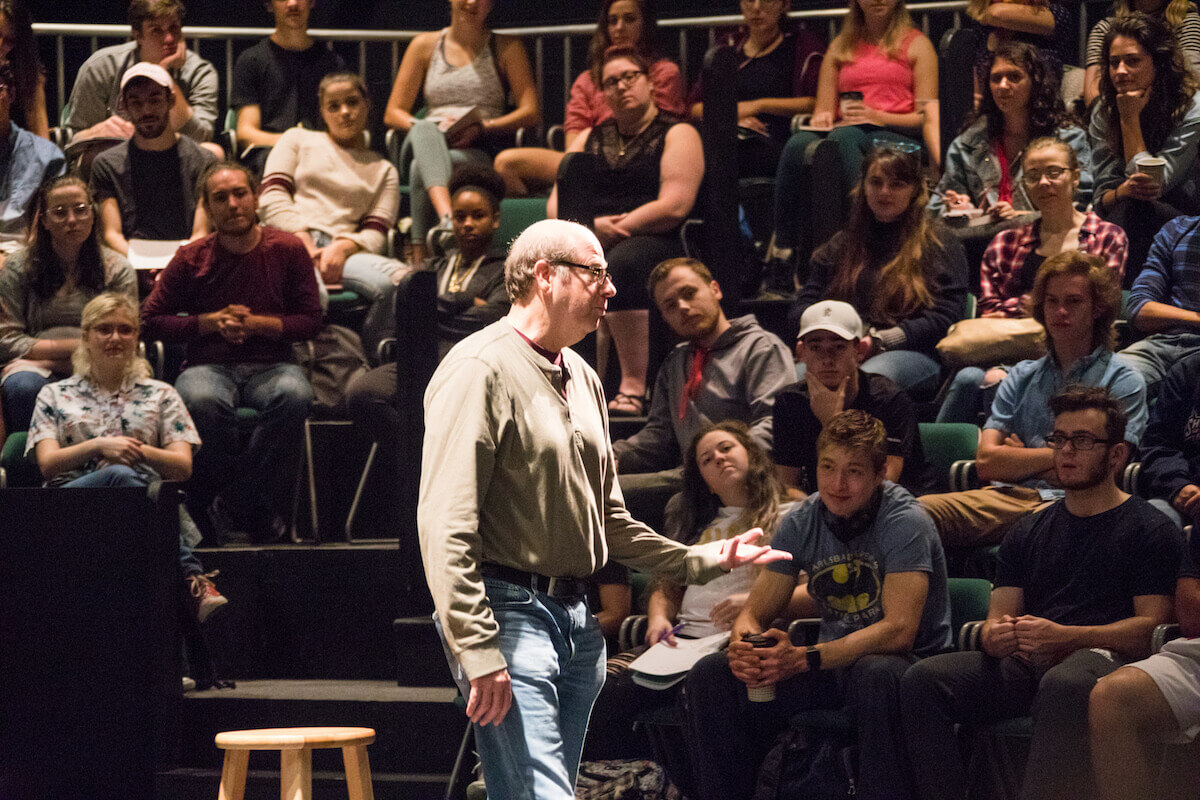
Legendary character actor Stephen Tobolowsky wrapped up a three-day visit to Winchester with an Oct. 8 question-and-answer session with Shenandoah University students in an appearance sponsored by the Alamo Drafthouse Cinema, the College of Arts & Sciences’ film studies program and the Shenandoah Conservatory acting program.
Tobolowsky, known for roles in films like “Groundhog Day,” “Memento,” “Garfield,” “Freaky Friday,” and “Spaceballs,” and television shows like “The Goldbergs,” the reboot of “One Day at a Time,” and “Silicon Valley,” shared his thoughts about acting, writing and living with an audience filled with actors, writers and future directors.
Adding instead of subtracting
Actors, writers and musicians are the luckiest people in the world, Tobolowsky said, because anything they study becomes part of who they are, and usable in their chosen craft. Such input is essential, he said.
He said he realized, after what was supposed to be a fatal accident in Iceland, that the process of addition (new, often simple, input) brings happiness, while depression often arises when a person experiences subtraction. For example, as his vertebrae healed, he couldn’t lie down and had to sleep, wedged in a corner. He was depressed, and felt the loss (subtraction) of what he had before. However, when his wife helped him move the bench on which he sat each day to a new part of the yard, as he saw the light from a different angle, or the shadows fall in a new way, he felt better as a result of the addition of these new experiences. His injury also led to his career as an author. He began to write to share his life experiences with his children. His books are “The Dangerous Animals Club,” and “My Adventures With God.”
Time to show up
Showing up is an integral part of success, said Tobolowsky, who is also a podcaster (The Tobolowsky Files) and an animation voice artist.
He has a simple answer when he’s asked how he has maintained a decades-long entertainment career: “I’m on time and I come prepared and I don’t cause trouble.” Being reliable is an essential trait. When a person doesn’t show up for a film project it doesn’t inconvenience just one person, it inconveniences 70 people, he said.
“The most important thing you can do is learn to be disciplined,” he added.
Paying attention, stepping up, and making choices
Tobolowsky’s Hollywood career started on his first day in Los Angeles, as he attended an acting class. There, he heard about how a person was needed quickly for a role in a play. He said he’d do it, and was on stage later that week, with a faulty pay phone prop. His performance caught the eye of a casting director, who ultimately called him in on all her projects for the next two decades.
During the Q&A, he took a pair of students through the Meisner technique (on which Shenandoah’s acting program focuses) “repetition exercise,” which has four levels, which begin with observation and behavior and continue through to emotional responses. The exercise allows for actors to understand where their emotional weak points may be, and it doesn’t allow for confusion, which he said can’t exist for artistic projects, because when it does, the work goes nowhere. When two emotions or ideas collide, he advised actors, directors and writers to just to pick one and follow it. The problematic scene’s clarity will reveal itself as it progresses.
Tobolowsky’s advice: “Just do it”
Tobolowsky offered up some tips, both while talking during the official Q&A and after, as students gathered around to ask more questions and pose for photos with him:
“If you have a funny line, say it. Just say it,” he said. “If your line is funny, just say the damn line.”
If you give a line an odd inflection, the tone takes precedence over the line, he said, using as an example his “Groundhog Day,” line, “Watch out for that first step, it’s a doozie!”
Movement usurps meaning. When an actor moves, people don’t hear what they say. He demonstrated by walking while saying lines common to actors playing lawyers in courtroom dramas. He then stood still as he uttered the lines, “My client is innocent.” “If you want meaning. . . grow roots,” he said.
If you want to make films, learn by making them. He said films can be made with minimal equipment, and that he was very impressed by the film “Tangerine,” which was shot with iPhones. For anyone who makes films that way, he said, “make sure your sound is good,” and if there’s any money to be spent on a project, it should be spent on a good sound person.
“Just do it. Don’t be afraid to fail. Failure is part of the good stuff,” he said.
He cautioned students against being critics of their own work. A person can be an actor, director, and/or writer on a project, but not its critic, because when an artist criticizes themselves, they can end up doing nothing. After the official Q&A, he continued to explain what he meant about self-criticism, in conversation with a couple of students who asked to hear more. He said as they grow as actors, they’ll learn more about what works for themselves and what doesn’t. Right now, the best way to grow is by being free. The only things students could do wrong right now, he said, is “not telling the truth and getting in your own way.”
As he talked about challenges, he noted that for professionals, time is often an issue. Students usually have the time they need or want to prepare for a performance. In the professional world, he said, “You get the time you get.”
Improv “is the most important skill you could have,” he said, as he spoke to Meredith McClure, the vice president of Shenandoah’s improv group, The Loaf. (The pair wrapped up their conversation with a good-natured thumb wrestling match that arose from a handshake attempt.) As a professional, “improv is where you’re gonna live.” Tobolowsky teaches improv and also works once a month with the Upright Citizens Brigade, which sent a performance troupe to Shenandoah, courtesy of The Loaf, in fall 2017.
